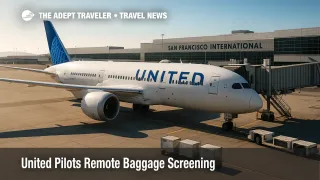United pilots remote baggage screening to speed SFO connections

Connecting United Airlines customers arriving from Australia will now skip the most time-consuming step of U.S. connections. United, working with U.S. Customs and Border Protection (CBP) and the Transportation Security Administration (TSA), has launched International Remote Baggage Screening on its daily Sydney Kingsford Smith Airport (SYD) to San Francisco International Airport (SFO) flight for travelers continuing onward. Checked bags are screened in flight and transferred directly to the next aircraft unless CBP requests an inspection, trimming average layovers by about 45 minutes.
Key points
- Why it matters: Faster connections and fewer missed flights for long-haul arrivals.
- Travel impact: No reclaiming or rechecking of bags at SFO for eligible SYD arrivals.
- What's next: United plans to extend the program to additional international routes.
- CBP performs remote screening; TSA secondary checkpoint still applies after passport control.
- Part of a broader push alongside TSA's "One Stop Security" pilots on select London routes.
Snapshot
Under International Remote Baggage Screening, travelers check luggage as usual at SYD. While the flight is en route, CBP officers review bag imagery from overseas screening systems that meet U.S. standards. Upon arrival at SFO, eligible customers clear passport control, proceed through a TSA checkpoint, and head straight to their gate, while their luggage is sorted to the departing flight without a claim-and-recheck loop. CBP can still pull a bag for inspection if needed. United says the new flow saves customers roughly 45 minutes on average and reduces misconnects on one of its longest international services.
Background
For decades, most international-to-domestic connections in the United States required four steps: immigration, baggage claim, customs, and a second TSA screening before re-entering the sterile area. That routine consumed time and added congestion at busy hubs. Two efforts are now easing the pain. CBP's International Remote Baggage Screening moves baggage checks upstream by evaluating imagery captured at select foreign airports, allowing seamless bag transfers stateside. In parallel, TSA's "One Stop Security" pilot recognizes commensurate screening at London Heathrow Airport, letting eligible passengers arriving at Dallas Fort Worth International Airport (DFW) and Hartsfield-Jackson Atlanta International Airport (ATL) skip the second TSA checkpoint. Together, these programs aim to standardize trusted processes, cut connection times, and improve reliability.
Latest developments
United's SYD-SFO rollout and how the SFO connection works
United's launch covers passengers on the daily SYD-SFO flight who hold onward connections. Bags are tagged through to final destination at Sydney Kingsford Smith Airport (SYD), then screened remotely by CBP while airborne. After arrival at San Francisco International Airport (SFO), customers clear passport control, pass a TSA checkpoint, and continue to their next gate without visiting baggage claim; bags are moved directly from the inbound hold to domestic sortation and onto the connecting aircraft unless CBP flags them. United reports average time savings of about 45 minutes and expects fewer missed connections during peak banks as a result. The carrier says additional routes are planned as partners and infrastructure come online.
How this differs from TSA's "One Stop Security"
International Remote Baggage Screening and "One Stop Security" address different choke points. IRBS removes the baggage recheck step by validating hold-bag screening before landing but still requires passengers to clear a TSA checkpoint after passport control. One Stop Security, currently limited to certain London Heathrow arrivals into DFW and ATL, removes that second TSA screening entirely for eligible flights. For context on OSS's U.S. rollout and what travelers can expect on those routes, see Adept Travel's coverage: TSA One Stop Security Starts on Heathrow to Dallas-Fort Worth, Atlanta and earlier background on American's pilot: American Pilots 'One Stop Security' for Heathrow-DFW.
Analysis
Operationally, IRBS tackles the most failure-prone segment of the U.S. connection: the baggage hall handoff. Long-haul arrivals often blow past minimum connection times because reclaim carousels, customs queues, and recheck belts operate as separate systems with different bottlenecks. By validating bag screening upstream and preserving chain-of-custody from the foreign screening point to the domestic sorter, United and CBP remove an entire passenger touchpoint while retaining the option to intervene when needed. For SFO, which mixes long-haul international banks with tight domestic waves, even a 20- to 45-minute average gain can stabilize downline departures and free TSA capacity for true origin passengers.
Travelers should still budget time for passport control and a TSA checkpoint at SFO under IRBS. That is why the program complements, rather than replaces, TSA's One Stop Security, which eliminates the second screening on specific Heathrow routes to DFW and ATL. Expect uneven availability in the near term, since both efforts require bilateral agreements, technical integration of screening data, and airport-specific facility tweaks. The upside is significant: if IRBS scales to more gateways, airlines can confidently sell tighter connections from long-haul arrivals, baggage mishandling should fall on protected transfers, and missed-connection rebooking costs could drop. The key will be maintaining security equivalence and transparent criteria so customers know exactly when the simplified flow applies.
Final thoughts
United's Sydney-San Francisco deployment shows how much friction can be removed from U.S. connections by rethinking baggage screening. Even with a required TSA checkpoint at SFO, skipping baggage claim and recheck meaningfully speeds the journey and reduces misconnect risk after a 13-hour flight. Watch for additional city pairs as CBP, TSA, airports, and carriers validate systems and expand participation. For now, United flyers connecting at SFO off the SYD flight get a preview of a smoother future for international transfers powered by international remote baggage screening.
Sources
- United launches CBP's International Remote Baggage Screening on select international flights, United newsroom
- CBP launches innovative International Remote Baggage Screening, U.S. Customs and Border Protection
- U.S., South Korea strengthen security partnership with enhanced baggage screening, U.S. Customs and Border Protection
- 'One Stop Security' pilot program aims to simplify international travel, TSA
